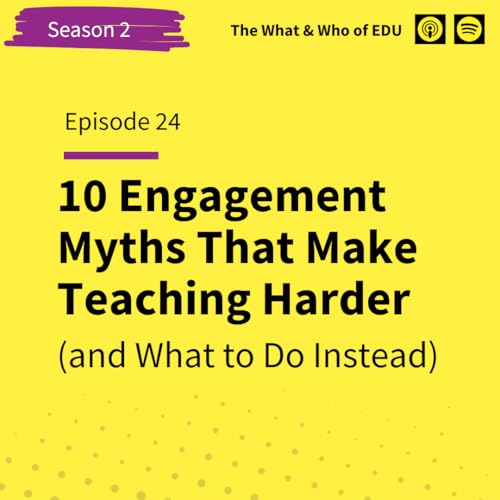What if the most powerful teaching tips weren't found in textbooks, but in the lived wisdom of the educators down the hall? In this Season 1 finale, host Marisa Bluestone counts down 10 unforgettable mic-drop moments from the year, the ones that stuck, stirred something, and might just reshape how you teach. From building student belonging in unexpected places to teaching confidence through well-timed mistakes, these research-backed teaching strategies are as practical as they are profoundly human. Binge the full episodes below during your next walk, commute, or grading break. Brought to you by Macmillan Learning Best of Season 1 Episodes: From Anxiety to A‑Game: 10 Ways to Build Student Confidence Listen on Spotify, Apple, or wherever you get your podcasts From Me to We: 10 Strategies to Build Belonging Listen on Spotify, Apple, or wherever you get your podcasts Little Reflections, Big Gains: Digging Into the Data on Student Belonging & Metacognition Listen On Spotify, Apple, or wherever you get your podcasts From "Is This on the Test?" to "Here's What I Think": 10 Ways to Make Critical Thinking Happen Listen On Spotify, Apple, or wherever you get your podcasts Advice New Teachers Actually Need: 10 Tips From Educators Who've Been There Listen on Spotify, Apple, or wherever you get your podcasts 10 Ways to Create Accessible Classrooms that Lower the Barriers (Not the Standards) Listen on Spotify, Apple, or wherever you get your podcasts This Is Not a Test: 10 Ways Instructors Measure Learning Beyond Grades Listen on Spotify, Apple, or wherever you get your podcasts The Psychology of Psychology: Drs. Dave Myers & June Gruber Discuss Emotion, Happiness & Students' Wellbeing Listen on Spotify, Apple, or wherever you get your podcasts From Grades to Grit: What Psychology Authors Drs. Dave Myers and June Gruber Want Every Student to Know Listen on Spotify, Apple, or wherever you get your podcasts 🎓 Featured Educators Meet the voices behind this season's top teaching strategies (in order of appearance): Dr. Jennifer Ripley Stueckle has spent the past 17 years as a Teaching Professor and Non-Majors Biology Program Director at West Virginia University. She has taught introductory biology, immunology and human physiology. She also created biology courses offered through dual enrollment at West Virginia high schools. Dr. Erika Martinez is a Professor of Instruction at the University of South Florida, where she has taught economics for 14 years. She's passionate about making economics accessible and engaging for all students and also teaches at UNC-Kenan Flagler Business School's MBA@UNC online program and Santa Barbara City College. Julie Moore has been teaching writing and literature in Higher Education for 35 years, and is currently working as a Senior Online Academic Advisor and First-Year Composition Instructor for Eastern University. She's authored four collections of poems, with several notable prizes including the Donald Murray Prize from Writing on the Edge. Marcy Baughman is Vice President of Learning Science and Insights at Macmillan Learning. She leads a team of researchers focused on translating student data into practical tools that help educators and institutions support learning that sticks. Dr. Christin Monroe is an Assistant Professor of Chemistry at Landmark College, where she has been teaching for five years. She teaches in Principles of Chemistry, Introduction to Chemistry, Organic Chemistry, and Biochemistry, with a focus on supporting neurodivergent learners through inclusive and innovative teaching practices. Betsy Langness is the Psychology Department Head at Jefferson Community and Technical College, where she has worked for more than 20 years. She teaches general and developmental psychology courses in a virtual, asynchronous environment. Mary Gourley is a psychology instructor at Gaston College with over 16 years of teaching experience. She also teaches gender, human sexuality, and social psychology courses at New Mexico State University's Global Campus. Jennifer Duncan is Associate Professor of English at Georgia State University's Perimeter College. Jennifer has been teaching English literature and composition for twenty-five years and specializing in online teaching for fifteen. Dr. Star Sinclair is an Assistant Professor of Psychology at Florida Gulf Coast University. For 18 years, she has taught general psychology, lifespan development, behavioral statistics, and research methods in psychology to students of all backgrounds and preparation levels. Dr. June Gruber is an Associate Professor of Psychology and Neuroscience at the University of Colorado Boulder and Director of the Positive Emotion & Psychopathology Lab. Her research explores emotion science, mental health, and the science of well-being. Dr. David G. Myers is a Professor of Psychology at Hope College and author of the world's best-selling psychology textbook. His research spans behavior genetics, ...
続きを読む
一部表示

 28 分
28 分 25 分
25 分 25 分
25 分

